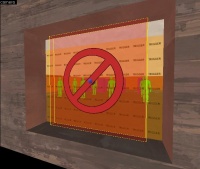Team Fortress 2/Creating a Spawnroom: Difference between revisions
(More info) |
(More info for the regenerate stuff) |
||
| Line 14: | Line 14: | ||
==Respawn and resupply== | ==Respawn and resupply== | ||
[[image:Tut spawnroom r4.JPG|thumb|right|200px|Add a resupply somewhere obvious.]] | [[image:Tut spawnroom r4.JPG|thumb|right|200px|Add a resupply somewhere obvious.]] | ||
It may be a good to have a resupply area inside your respawn. A resupply consists of 2 things: a {{ent|prop_dynamic}}, representing the resupply locker, and a {{ent|func_regenerate}}, which gives it functionality. Create a {{ent|prop_dynamic}} somewhere in the room, set its model to <code>models/props_gameplay/resupply_locker.mdl</code>, and give it a name <code>resup1</code>. Now create a {{ent|func_regenerate}} brush-based entity with material <code>tools/toolstrigger</code>, making sure it occupies a larger area around the prop. Set its <code>Associated Model</code> to the name of the dynamic prop its and Team to RED.{{clr}} | It may be a good to have a resupply area inside your respawn. A resupply consists of 2 things: a {{ent|prop_dynamic}}, representing the resupply locker, and a {{ent|func_regenerate}}, which gives it functionality. Create a {{ent|prop_dynamic}} somewhere in the room, set its model to <code>models/props_gameplay/resupply_locker.mdl</code>, and give it a name <code>resup1</code>. Now create a {{ent|func_regenerate}} brush-based entity with material <code>tools/toolstrigger</code>, making sure it occupies a larger area around the prop. However note that you might need to make the volume a certain size that way it does not create exploits in anyway. Set its <code>Associated Model</code> to the name of the dynamic prop its and Team to RED.{{clr}} | ||
==Keeping the bullies out== | ==Keeping the bullies out== | ||
Revision as of 14:46, 27 September 2007
Creating your room
First of all, you should have an area which you consider the spawnroom. This may be of any shape, color, and size. For this example, the room you see on the right will be transformed into a spawnroom for the RED team.
Making it a respawn room
Create a func_respawnroom brush-based entity with material tools/toolstrigger that fills your area. Name it something like red_respawn_room_01 and set its team to RED. Name it accordingly due to how many spawn rooms you may have for the same team.
Bring the players inside
Now you need to add the player spawns. Create an info_player_teamspawn in your room. Change the spawn's team to RED. Make 11 to 15 copies of the player spawn entity, giving each of them plenty of space. Give your Info_player_teamspawn entity's all the same name. In example Team_red_player_01. This naming system can later help also with which entity spawns in what spawnroom.
Respawn and resupply
It may be a good to have a resupply area inside your respawn. A resupply consists of 2 things: a prop_dynamic, representing the resupply locker, and a func_regenerate, which gives it functionality. Create a prop_dynamic somewhere in the room, set its model to models/props_gameplay/resupply_locker.mdl, and give it a name resup1. Now create a func_regenerate brush-based entity with material tools/toolstrigger, making sure it occupies a larger area around the prop. However note that you might need to make the volume a certain size that way it does not create exploits in anyway. Set its Associated Model to the name of the dynamic prop its and Team to RED.
Keeping the bullies out
Some players like to camp in spawn rooms, spawn-killing players. There, however, is an easy solution. Create a func_respawnroomvisualizer brush-based entity with material tools/nodraw. Assign material overlay/no_entry to the side that faces away from the spawn area. Be sure to set its Associated Respawn Room accordingly. This will block only BLU players.
Last words
It's easy to create a basic spawn room. The tutorial covers the minimum; you might, for instance, want to create a door that only opens for RED players, or multiple spawn rooms associated to different control point. These will be covered in other tutorial later.




